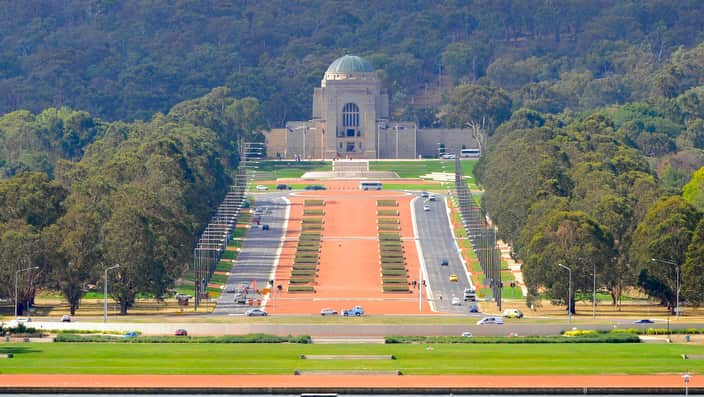KEY POINTS:
- The federal government is being urged to rip out hundreds of Chinese-made cameras.
- Nearly a thousand have been found in Commonwealth buildings across Australia.
- Senator James Paterson says agencies are suffering an 'alarming exposure'.
Labor is being urged to remove hundreds of Chinese-made surveillance devices in government buildings, over concerns they may be helping Beijing's spy efforts.
An audit of federal agencies, sparked by Liberal senator James Paterson in September, has found at least 913 Chinese-made cameras located across 254 government buildings.

Senator James Paterson says Australia's agencies are 'alarmingly exposed' to the devices. Source: AAP / Mick Tsikas
"We urgently need a plan from the Albanese government to rip every one of these devices out of Australian government departments and agencies," he said.
The Attorney-General is seeking advice on whether a government-wide ban is necessary, Labor frontbencher Murray Watt stressing the cameras were installed under the former Coalition government.
"It is good that Senator Paterson is now taking an interest in this issue, an issue that neither he nor anyone else in the former government saw as worthy of investigation at the time. But unlike the Coalition government, this government is taking action," he said.
So where are the devices, and do they pose a threat to national security?
Where are the cameras?
The audit found nearly 1000 in Commonwealth buildings across the country.
Australian War Memorial chair Kim Beazley this week announced Hikvision cameras will be removed by mid-2023, out of what he said was an "abundance of caution".
They'll also be removed from National Disability Insurance Scheme in Geelong, while at least one has been found in Department of Defence buildings.

The War Memorial has already announced a decision to remove devices. Source: AAP
So far the audit has found 195 cameras in the Attorney-General's Department offices, 154 in Climate Change and Energy offices, and 127 in Government Services offices.
The government on Thursday confirmed no devices are located in Department of Prime Minister and Cabinet offices.
It conceded there are "some legacy" CCTV systems in "non-sensitive areas" of the Department of Foreign Affairs and Trade, but said they are not connected to the internet or agency IT networks.
Are the Chinese-made cameras a risk?
Senator Paterson says two companies in particular - Hikvision and Dahua - have been "directly implicated" in human rights abuses against the Muslim Uyghur population in Xinjiang.
He also says Chinese companies are obligated to cooperate with the country's intelligence agencies, and keep that cooperation a secret.
"These companies or their employees could be required to pass over the sensitive data, images or audio collected by these devices in Australia to Chinese intelligence agencies ... We can't just treat these like any other company," he told the ABC on Thursday.
"They present a really unique and significant national security risk."

Prime Minister Anthony Albanese has met with Chinese President Xi Jinping in Bali. Source: SBS News
The UK and the US - Australia's AUKUS partners - banned Hikvision and Dahua devices from all government buildings in November, citing national security concerns.
At the time, Hikvision flatly denied having the capacity to transmit data to third parties. "[It is] categorically false to represent Hikvision as a threat to national security," it said.
What do experts say?
Nigel Phair, director at the University of NSW's Institute for Cyber Security, told SBS News all modern CCTV cameras are internet-enabled, posing a challenge for security.
"All internet devices are hackable. [But] the problem with the cameras is not so much that they're hackable, it's that they're already pre-programmed to potentially send the information they receive and report back to third parties," he said.

"They should look at where the cameras are, the material they're collecting, and how sensitive it is. If it is substantive, is very sensitive, then they should remove them," he said.
"We can certainly use devices manufactured by other countries. In doing so, we should look at what those countries are and do an analysis of those cameras to see how safe and secure they are."
Could this hamper relations between Australia and China?
Relations between the two countries have shown signs of thawing since the May election.
But China has a history of reacting strongly to decisions Australian governments have taken on national security grounds.
Beijing was angered by the federal government's 2021 decision to tear up Victoria's Road and Belt initiative, which came just three years after it banned Chinese tech company Huawei from its 5G network.

Anthony Albanese says Australia will respond "transparently" and in the national interest. Source: AAP / Lukas Coch
But Prime Minister Anthony Albanese pushed back against claims placating China would play a role in any decision over the so-called "spy cameras".
"We act in accordance with Australia's national interest. We do so transparently. That's what we'll continue to do," he told reporters on Thursday.
Washington also said this week that Beijing had refused its request for a phone call, after the US downed a Chinese "spy" balloon which had been travelling through its airspace.









